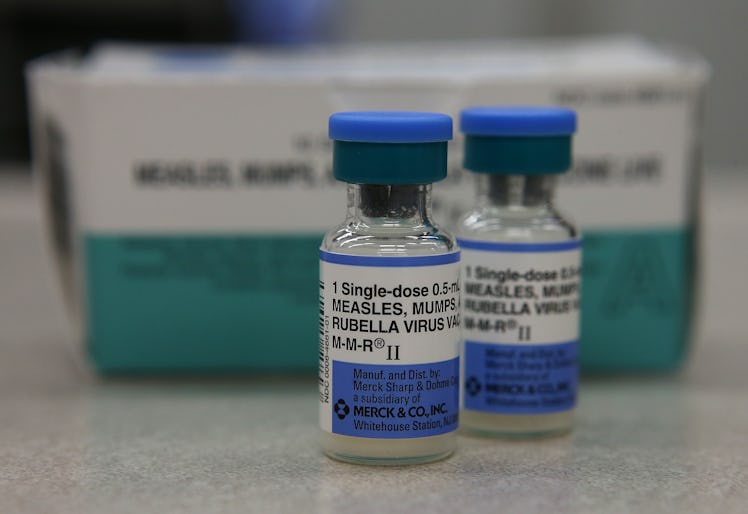
Here's What Experts Want You To Know About The Measles, Even If You've Been Vaccinated
Just when you thought cold and flu season couldn’t get any worse, another viral infection rears its ugly head. As of Feb. 7, 2019, the Centers for Disease Control and Prevention (CDC) have reported individual cases of measles in 10 states across the United State, including California, New Jersey, New York, and Illinois. The CDC report goes on to explain that measles are oftentimes contracted in “pockets of unvaccinated people.” The bad news is, there’s a chance you can get measles, even if you’ve been vaccinated. The good news is, it’s highly unlikely.
Before I jump right into the ins and outs of measles vaccinations, though, let’s backtrack for a second. I know myself, and up until recently, I’d only heard of the measles; I never really knew what the infection entailed. So just in case you’re kind of scratching your head on the other side of the screen, too, allow me to clarify: According to Robert Glatter, M.D., an assistant professor of emergency medicine at Lenox Hill Hospital, Northwell Health, measles is a highly contagious viral infection that affects the respiratory system, leading to “high fever, runny nose, red eyes, cough, as well as a generalized, raised, red rash on the body.” And even though it might sound like nothing more than a nasty cold, per the Mayo Clinic, "measles can be serious and even fatal for small children" in some cases. As Glatter tells Elite Daily, "The disease can lead to dangerous and potentially fatal complications including encephalitis (inflammation and swelling of the brain), further complicated by seizures and loss of protective airway reflexes such as breathing. Other important complications include pneumonia and ear infections." Yikes.
Measles can spread from coughing and sneezing via “little droplets,” Glatter explains, and the virus is so strong that these little infectious particles can live for up to two hours in the air after the person carrying the disease coughs or sneezes. So, essentially, anyone who breathes in that same contaminated air or touches an infected surface — and then touches their nose, mouth, or eyes — is potentially at risk of contracting the virus. Those who haven’t been vaccinated, Glatter adds, are 90 percent more likely to be at risk than those who are vaccinated.
Circling back to that whole “you can get the measles even if you're vaccinated” thing, for what it’s worth, I know that I forever come off as the bearer of bad news, but these are the facts, and it’s my job to report them, friends. So here’s the deal: It’s unlikely that you’ll catch the measles if you've been vaccinated. That being said, according to Glatter, the vaccine itself is only between 93 and 97 percent effective.
During our chat via email, Glatter tells me that the measles vaccine, also referred to as the measles, mumps and rubella (MMR) vaccine, is a two-shot series; if you receive one shot, you’re only 93 percent protected. And, granted, one shot is better than no shot, but that 4 percent could be the difference between avoiding the virus and catching it, so it seems like doubling up doses is probably worth it. Plus, as far as I know, vaccinations, kind of like birth control, are never 100 percent effective, but not getting vaccinated will definitely increase your risk of catching viral illnesses. I’ll let you decide what’s worse.
While we’re on the subject, getting vaccinated is not only important in that it protects you from contracting the virus, but in the grand scheme of things, getting vaccinated will also help to lower the odds of an outbreak in your area. According to Dr. Felice Adler-Shohet, director of outpatient services for the division of infectious diseases at CHOC Children’s Hospital, in order to prevent the spread of measles in a community, “95 percent or more of the population must be vaccinated or immune to measles,” which would then establish what's referred to as a “herd immunity.”
What makes the 2018-2019 measles outbreak so concerning is that, unlike the flu, which goes around and comes back around at the same time every year, the measles were thought to be eradicated in 2000, Glatter tells Elite Daily. “The main source that is now fueling the resurgence in the U.S. is refusal of anti-vaxxer parents to immunize their children,” he explains, noting that international travel plays a key role, too. “The other source is people who are not immunized who travel internationally to countries where measles is still active, and then bring the disease back to the U.S.”
For example, in New York, specifically, Dr. Adler-Shohet adds, "There were several people that initially caught measles after exposure to an ongoing measles outbreak in Israel." And because the affected community in New York had low vaccination rates, she explains, the virus spread quickly.
So where can you get vaccinated? Well, for starters, you might already be vaccinated. Per the CDC, babies are typically given the measles vaccine when they're between 12 and 15 months old, and the shots are administered a second time at 4 to 6 years old. However, if you haven't been vaccinated, or you know for a fact it's been awhile, the CDC highly recommends teens and adults check their medical records and follow up with their doctors.
For reference, according to the U.S. Department of Health and Human Services, you can get vaccinated at local pharmacies, clinics, and health centers. To find out where you can get vaccinated in your area, log on to www.vaccines.gov, enter your zip code, and you'll find a list of places nearby that offer the vaccination you need.